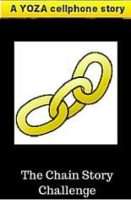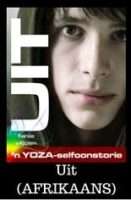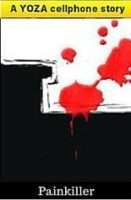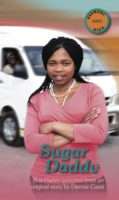For the next two days we scoured hospitals and drug dens with my Uncle Clive. I hardly slept, surviving on ten-minute naps while we drove around searching. What woke me up each time was what I saw in those naps – Simphiwe with his back to me, then disappearing.
On the afternoon of the second day I woke from one of those naps to see Uncle Clive looking straight at me. We were at a red traffic light. He kept his eyes on me as the light turned green and we drove off.
“Khulekani, we must try other means. There are people with gifts out there; we must try traditional healers as well. There is one in Port Shepstone. I hear he is good at finding the lost. I know my sister doesn’t believe in that world, but in the situation we are in we have to try everything. Saved or not saved, we are still African,” he said.
“I have been dreaming of him since he disappeared, but more so in the last two days. He has his back to me and disappears when I focus. If the healer can help us find him, we should visit him,” I said.
“We have to wake up early tomorrow because Port Shepstone is far. We must be on the road by half past three at the latest.”
After a long silence he added, “We have to start searching morgues as well. Better sooner than later.”
That night I switched my cellphone off and cried. I tried to sleep, hoping to find Simphiwe in my dreams. But sleep was elusive so I stared into the dimness of our room, faintly lit by the streetlight outside. I could see Simphiwe’s drawing, the one of a shimmering lake on the wall, come to life. I turned away from his art to the blank wall on my side of the room, shell-shocked that it had finally come to traditional healers and morgues.
I switched my phone on around two in the morning. There were several voice messages from Detective Shange, and one SMS from Anele. She was just checking on me. Asked why I had missed the test; said working on test papers was no fun without me.
Detective Shange was serious in the voice messages. “Call me when you get this,” all his messages said. I didn’t bother to return his calls. I was in no mood to talk about bribes. I opened the curtain and saw Uncle Clive parked at the gate. I had one of Simphiwe’s T-shirts with me. An item of clothing was necessary in aiding the traditional healer to find him.
While we were driving to Port Shepstone Detective Shange called repeatedly – first from his cell number, then from his office number, so finally I answered.
“There is someone at the station you need see immediately.” My heart filled my chest with one loud thump as I mistook what he said to mean they had found and arrested Simphiwe. Before I could speak he proceeded. “He says he knows where your brother is.”
“We’ll be there in twenty minutes. Keep him there”, I said.
Uncle Clive stepped on it.
In Shange’s office there was a man in his late fifties. Introductions were made. This serene man was a traditional healer from Eshowe, north of the coast. He was the opposite of the traditional healer stereotype, being clean-shaven, no beads, no traditional garb, swank trousers and shirt, and his shoes were definitely imported Italian Mauri. Manqele was his name.
I learned later that he was something of a rock star in the world of traditional healing. He made his name during the floods of 1987 when he recovered over thirty drowned bodies. He knew the location, date and time when a corpse would wash up to shore, or resurface bloated and face-down in rivers and lakes. Over the years his gift of finding grew, and he started to find the living. Locating runaways, missing children, and young professionals no longer calling home since they moved to Gauteng, made him a mountain of money. He looked at Uncle Clive and spoke soft and slow.
“Two days ago I was in Pinetown blessing a new house for a client. While I was doing my work I was overpowered by a vision. Visions come to me when people approach me to find their lost ones, but this time it came to me before I was approached. I went back to Eshowe but what I was seeing grew stronger; it gained detail. Yesterday a voice started to partner the vision. It told me to come here and ask about a beating. I am seeing him now as we speak. He is wearing a blue T-shirt and black jeans, black and red shoes. He looks like this boy you are with, but darker.”
“Is he alive there, the place where he is?” I quizzed.
“His eyes are open. There are a lot of trees. Take me to where it all happened, and I’ll find him”
Detective Shange drove us to the scene. When we got there Manqele stood in the centre of the road and looked around for a while. He stood still in the darkness and right then I recalled that my new sneakers, the ones Simphiwe was wearing without my permission, were black and red.
“He was here, then he kicked his way out of many hands and ran that way,” Manqele pronounced, proceeding down the street.
We all followed him. He branched into another street, then another smaller dirt track, and finally reached a cliff at the end of the section. Manqele stood quiet, looking at the rocky twenty metre fall.
After a while he said, “He fell here.”
Some morning light revealed a gentler route down. We followed him down and into a shrubby area. The rising sun uncovered it so clearly, the dense forest before us. “He is here.” Manqele pointed to the forest.
Detective Shange called the Dog Unit. During the wait for sniffer dogs Manqele suddenly walked into the forest. Shange took off the vest beneath his shirt and left it on a small tree for the Dog Unit to find and track us when they arrived. We stayed on Manqele’s heels, following him for over an hour. We looked around, calling out Simphiwe’s name. Manqele’s step grew less sure when we came to a clearer part inside the forest. He walked slowly, stopped and looked back to the dense trees we just negotiated. We turned to look back and saw the Dog Unit emerge. Two officers, white and black. Two hounds, both German Shepherd.
The dogs eagerly sniffed Simphiwe’s T-shirt and led the way further into the forest. At a stream they stopped and seemed confused. One barked towards downstream, the other sensed something upstream. The officers untied their leashes. They went off like bullets in opposite directions. Uncle Clive followed downstream with Shange and one Dog Unit officer, I went upstream with Manqele and the other officer.
We did not chase far. Hardly fifty metres upstream we found the beast barking savagely. The dog that sensed something downstream returned, a muddy object clenched in its jaw. Uncle Clive, Shange and the Dog Unit officer followed behind, winded. A tree branch scraped dirt from the muddy object, and I saw the colours red and black. Both dogs now went crazy, barking in the same direction across the stream, but hesitant to cross.
I saw red and black, and went as berserk as those sniffer dogs. I ran across the stream, went up an incline and found Simphiwe. He was just lying there with his eyes open, his body resting like he was in deep sleep. At first I thought what I saw was a smile on his face, but it was his dislocated jaw. His body stiff and swollen, hands hardened to claws. The twenty metre fall had broken him internally – later it was revealed he had a punctured lung, broken ribs, shattered right collar bone. I imagined him stumbling in pain until his final collapse, here. How long had it taken for him to die? I felt his cold neck, closed his eyes and I sat next to his body until the undertaker arrived.
*****
The resilience of our bleeding hearts accepted he was gone, and searched for the light.
“He was handsome,” said Aunt Busi.
“Lost,” said Uncle Sbu.
“But with that brain and vision he could have been a great somebody,” added Uncle Clive.
“My baby was gifted,” Ma said.
His karate coach called him a talent, his running coach declared him a natural runner.
I finished my diploma and got a great job that has taken me places. I have seen beauty. Pretty much every time I have been spiritually moved by wonderful landscapes I feel the same way and think the same thought – that Simphiwe could have drawn the life out of it.
Once every year, on the anniversary of the day we found him in the forest, I relive the ordeal of that week and it hurts. It’s a void I try to fill every day by thinking of him in a positive way – the way he was before the wunga.
***
Tell us what you think: Do you think this is a realistic ending? Why?




